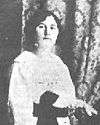Rómulo Gallegos
| Rómulo Gallegos | |
|---|---|
 | |
| President of Venezuela | |
|
In office 17 February 1948 – 24 November 1948 | |
| Preceded by | Rómulo Betancourt |
| Succeeded by | Carlos Delgado Chalbaud |
| Senator for life | |
|
In office 23 January 1961 – 5 April 1969 | |
| Personal details | |
| Born |
2 August 1884 Caracas, Venezuela |
| Died |
7 April 1969 (aged 84) Caracas, Venezuela |
| Political party | Acción Democrática |
| Spouse(s) | Teotiste Arocha Egui (1888-1950) |
| Religion | Roman Catholic |
| Signature |
|
Rómulo Ángel del Monte Carmelo Gallegos Freire (2 August 1884 – 7 April 1969[1]) was a Venezuelan novelist and politician. For a period of some nine months during 1948, he was the first cleanly elected president in his country's history.
Early life and writings
Rómulo Gallegos was born in Caracas to Rómulo Gallegos Osío and Rita Freire Guruceaga, into a family of humble origin. He began his work as a schoolteacher, writer, classical music enthusiast, and journalist in 1903. His novel Doña Bárbara was first published in 1929, and it was because of the book's criticisms of the regime of longtime dictator Juan Vicente Gómez that he was forced to flee the country. He took refuge in Spain, where he continued to write: his acclaimed novels Cantaclaro (1934) and Canaima (1935) date from this period. He returned to Venezuela in 1936 and was appointed Minister of Public Education.
Political career
In 1937 he was elected to Congress and, in 1940–41, served as Mayor of Caracas. In 1945, Rómulo Gallegos was involved in the coup d'état that brought Rómulo Betancourt and the "Revolutionary Government Junta" to power, in the period known as El Trienio Adeco. In the 1947 general election he ran for the presidency of the republic as the Acción Democrática candidate and won in what is generally believed to be the country's first honest election. He took office in February 1948, but officers Carlos Delgado Chalbaud, Marcos Pérez Jiménez and Luis Felipe Llovera Páez, threw him out of office in November in the 1948 Venezuelan coup d'état. He took refuge first in Cuba and then in Mexico. From 1960 to 1963, he was a Commissioner of the newly created Inter-American Commission on Human Rights (created on 18 August 1959), and he was also its first President (1960).
He was able to return to Venezuela in 1958. He was appointed a senator for life, awarded the National Literature Prize (1958, for La doncella), and elected to the Venezuelan Academy of the Language (the correspondent agency in Venezuela of the Spanish Royal Academy).[2]
Accolades
He was nominated for the Nobel Prize in Literature in 1960, largely due to the efforts of Miguel Otero Silva, and gained widespread support in Latin America,[3] but ultimately lost out to Saint-John Perse. The Rómulo Gallegos international novel prize was created in his honor in 1964, with the first award being made in 1967.
Personal life and death
Gallegos was married to Teotiste Arocha Egui, who served as First Lady of Venezuela in 1948. Rómulo Gallegos Freire died in Caracas on 5 April 1969.
-

Gallegos and Teotiste
-

Teotiste Arocha Egui
Published works
| Venezuelan Presidential election 1947 | ||||||||
| Results | ||||||||
| ||||||||
- El último Solar (1920) (alternative title:Reinaldo Solar)
- La trepadora (1925)
- Doña Bárbara (1929)
- Cantaclaro (1934)
- Canaima (1935) (also published in English, 1988 ISBN 0-8061-2119-X)
- Pobre negro (1937)
- El forastero (1942)
- Sobre la misma tierra (1943)
- La rebelión (1946)
- La brizna de paja en el viento (1952)
- Una posición en la vida (1954)
- El último patriota (1957)
Further reading
- Gallegos: Doña Bárbara / Donald Leslie Shaw., 1972
- Rómulo Gallegos: an Oklahoma encounter and the writing of the last novel / Lowell Dunham., 1974
- Nine essays on Rómulo Gallegos / Hugo Rodríguez-Alcalá., 1979
- Three Spanish American novelists a European view / Cyril A Jones., 1967
- Sociopolitical aspects of the novels of Rómulo Gallegos / Earl Leon Cardon., 1962
- The function of symbol in the novels of Rómulo Gallegos / Jeannine Elizabeth Hyde., 1964
References
| Wikimedia Commons has media related to Rómulo Gallegos Freire. |
- ↑ Fundación Centro de Estudios Latinoamericanos Rómulo Gallegos
- ↑ Real Academia Española / Academia Venezolana de la Lengua
- ↑ Jeannine Hyde (1960), "Rómulo Gallegos and the Nobel Prize in 1960", Hispania, Vol. 43, No. 2 (May, 1960), pp. 241-242
- DUNHAM, LOWELL. 1990: "Cartas familiares de Rómulo Gallegos". Cuadernos Lagoven. Lagoven, S.A. Caracas - Venezuela.
- MORON, GUILLERMO. 1979: "Los presidentes de Venezuela 1811–1979". Meneven, S.A. Caracas - Venezuela.
- ROMERO MARTÍNEZ, VINICIO. 1987: "Mis mejores amigos". Editorial Larense. Caracas - Venezuela.
- SUBERO, EFRAÍN. 1984: "Aproximación sociologica a la obra de Rómulo Gallegos homenaje en el centenario de su nacimiento".Cuadernos Lagoven. Lagoven, S.A. Caracas - Venezuela.
| Political offices | ||
|---|---|---|
| Preceded by Rómulo Betancourt |
President of Venezuela 1948 |
Succeeded by Carlos Delgado Chalbaud |
